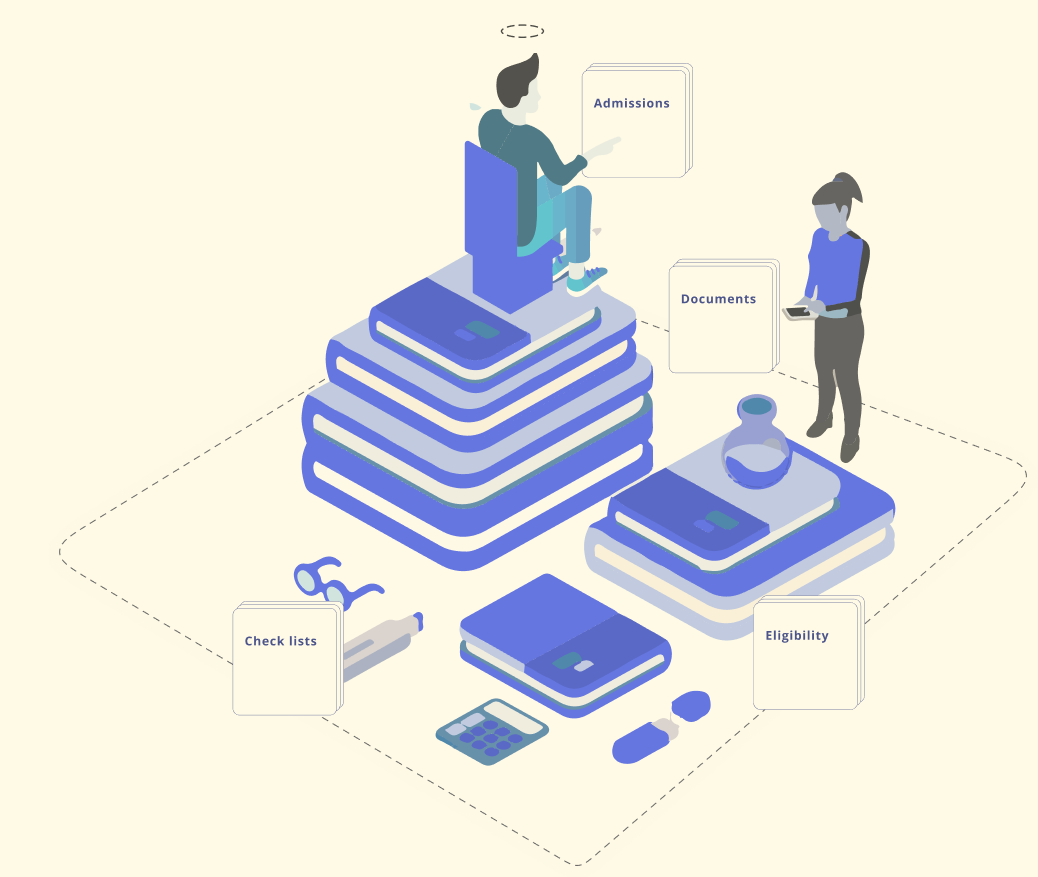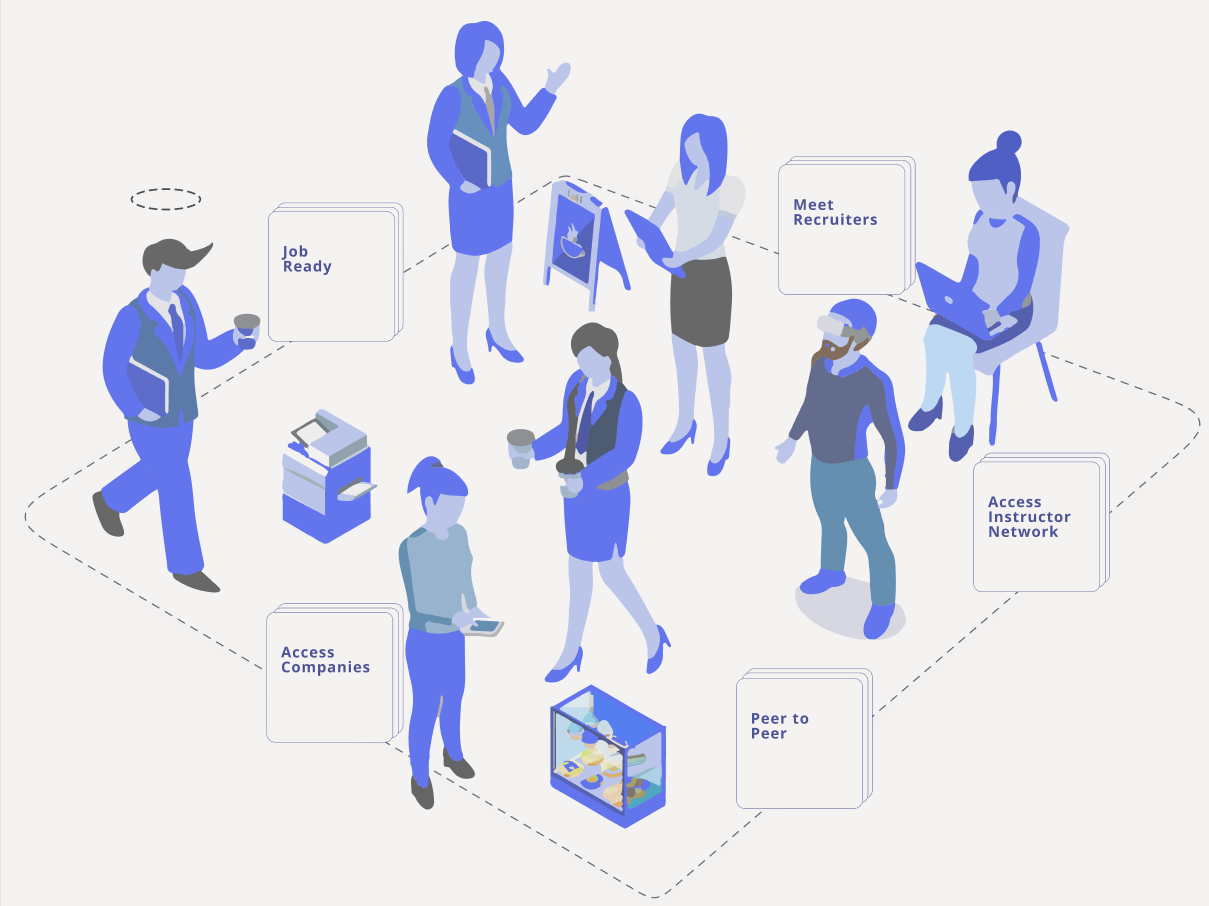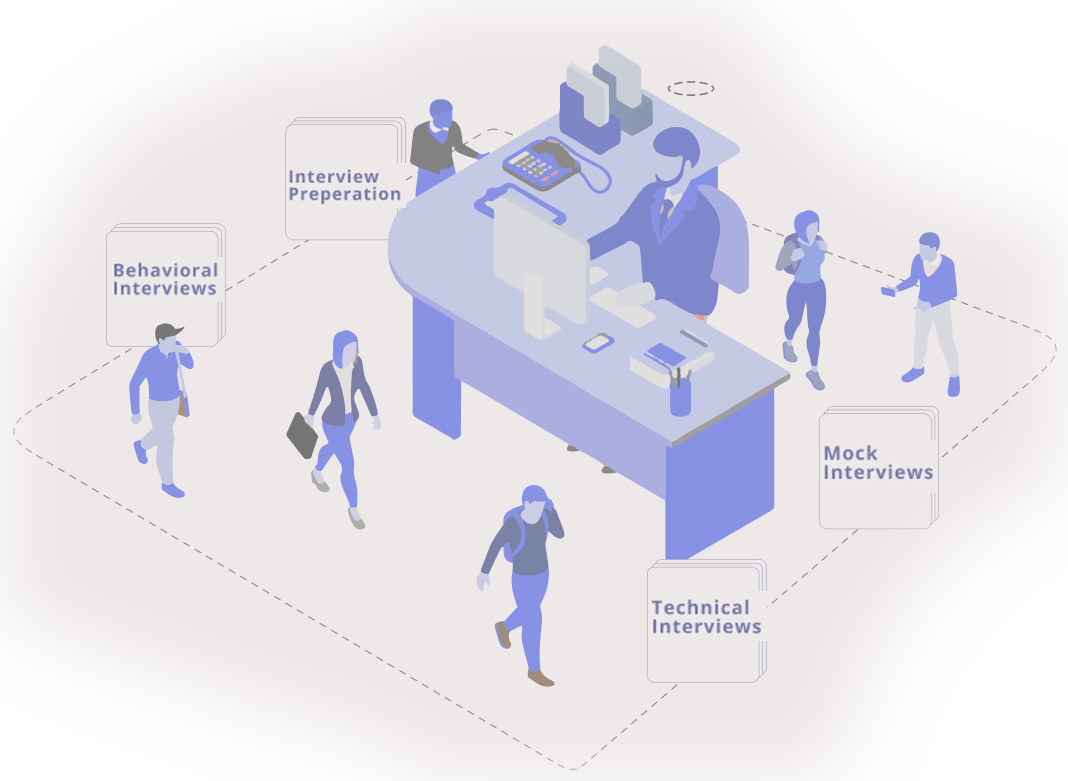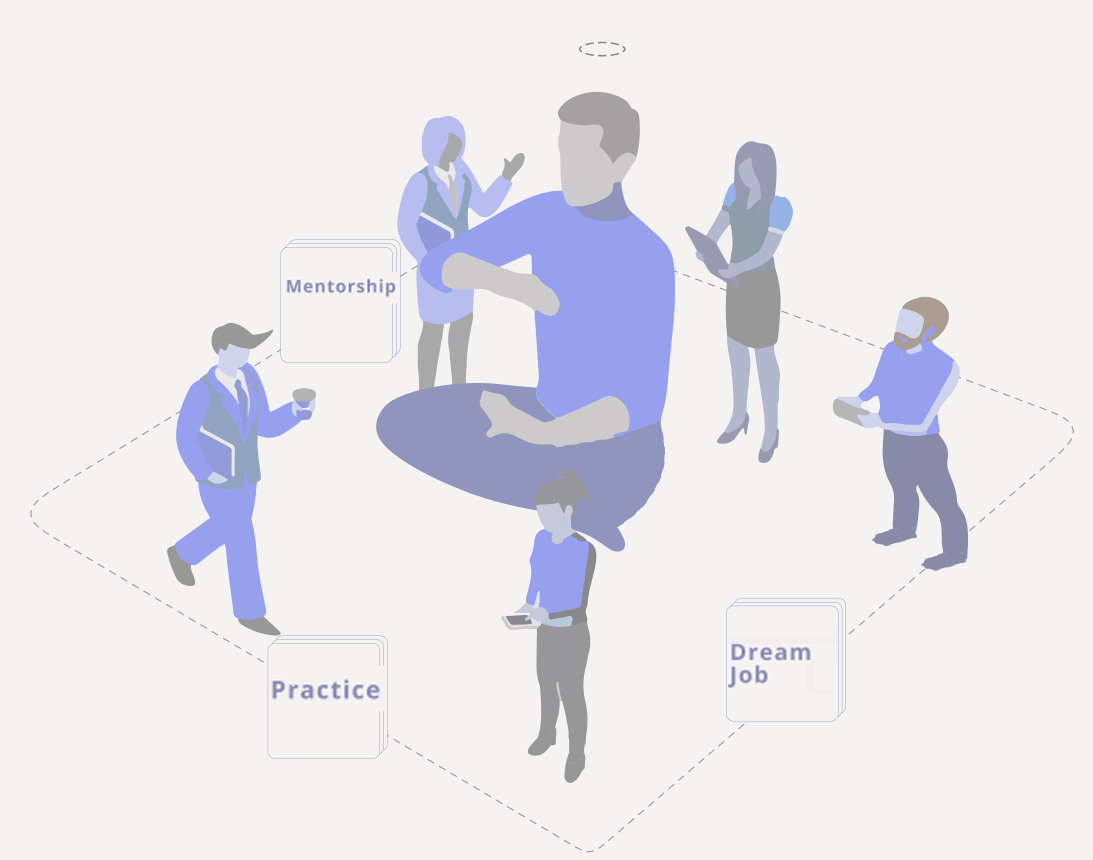Fast Track : 10 Months
Schedule: Monday, Wednesday, Friday
18h00 to 21h00-
13 June 2025
Mode of Delivery: Hybrid & Online Attend an Info Session
March 18th
6PM-7PM
Online
However, all the cloud services would be covered.
OVERVIEW
The MCIT Cloud Computing Program aids in your development as a cloud professional. You learn how to plan, design, and scale cloud implementations. Your ability to create and deploy dynamically scalable and dependable applications on Microsoft Azure and AWS will improve as a result of taking our Cloud Computing course.
Cloud professionals assess a business’ infrastructure and migrate different functions to a cloud-based system. They basically build and maintain cloud services by leveraging technical skills, business knowledge, and working experience with at least one of the major cloud providers (Amazon Web Services, Microsoft Azure, or Google Cloud Platform). They automate deployment and testing pipelines to enhance the efficiency of teams and deliver software faster.
- See if you Qualify
- Talk to an Advisor
COURSE OUTLINE
Cloud Computing
Download OutlineThis course introduces beginners to the fundamentals of networking, teaching the basics of connecting computers and devices. You will learn about IP addresses, routers, switches, and security protocols, which are essential for building and managing a network. The course will help you understand how data travels across networks and how to troubleshoot common network issues.
This course covers the essentials of IT infrastructure, focusing on cloud computing basics. You will explore how servers, storage, and networking are managed in the cloud, and gain an understanding of cloud service models like IaaS, PaaS, and SaaS. It's perfect for beginners looking to understand the backbone of modern IT environments.
In this course, beginners will learn programming and automation techniques to improve IT operations. You will work with scripting languages like Python to automate common IT tasks, such as system monitoring and data management, increasing efficiency and reducing manual errors.
This course introduces you to Amazon Web Services (AWS), one of the most widely used cloud platforms. You’ll learn how to navigate AWS tools, set up cloud environments, and understand key services like EC2, S3, and RDS. This is perfect for beginners who want to start their journey in cloud computing.
In this course, you will learn how to design scalable, reliable, and secure cloud architectures using AWS. The focus is on best practices for cloud design, including cost optimization, high availability, and disaster recovery, to build robust cloud solutions.
In this hands-on project, you will apply your knowledge of AWS to solve real-world problems. You will design and deploy cloud solutions using AWS tools and services, such as EC2, S3, and Lambda, demonstrating your ability to work on live projects.
This course introduces Microsoft Azure, teaching you the basics of cloud services and resources. You’ll learn how to set up and manage virtual machines, storage, and networking in Azure, laying the foundation for building and managing cloud environments.
Learn how to design effective, scalable, and secure cloud architectures using Microsoft Azure. This course covers best practices for deploying and managing applications in the Azure cloud, including cost management, security, and disaster recovery strategies.
This course provides strategies and tips for career growth, helping you create a personal brand and develop the skills needed for success. You’ll learn how to enhance your resume, prepare for interviews, and understand how to advance in the IT and cloud fields.
In this project, you’ll gain hands-on experience by working on a real-world cloud-based solution using Microsoft Azure. You’ll design, implement, and manage cloud applications, applying your knowledge of Azure services and architecture to create fully functional cloud environments.
Become ready for the workplace
These MCIT programs helps you to be job ready.
NETWORK EVENTS
The Intelligent Networking Networking with companies Instructors sharing their network Peer to peer networking Meet with recruiters.
Resume is the key to making the first impact with your profile.
INTERVIEW PREPARATION
Resume building, LinkedIn Training, Mock interviews hosted by companies, Technical interview prep, Behavioral interviews.
We assist you turn your projects into relevant portfolios.
PORTFOLIO PREPARATION
Turn your projects into a portfolio Portfolios tell your story Relevancy of the projects display experience.
Mentorship & guidance - the key to career success.
MENTORSHIP
The Mentors, instructors, or alumni help you understand the required skills for your desired career path and the path to land your dream job!
WHO SHOULD APPLY?
This program is aimed at creative candidates who wish to reorient their career or develop their business. Here is a list of professionals for whom learning cloud computing has proven to be a major asset:
Cloud Support Technician | Cloud Operations Technician | DevOps Technician | Site Reliability Technician | Cloud Developer | Cloud Administrator | Cloud Network Technician | Cloud Solutions Architect | Network Architect | Software Architect | Speak to an advisor to determine eligibility.
Admissions Process
The admission process entails the submission of several key documents. Applicants must provide their diploma and transcripts
- Highest level of education.
- Current resume detailing professional and education
- Birth certificate translated into either English or French
- 2 Photo identification are necessary

Upon successful completion, the college grants the student an MCIT Diploma in
Cloud Computing
INSTRUCTOR SPOTLIGHT

Sami Islam
Sami Islam has 10+ years of experience in the IT and Consulting Industry, specializing in comprehensive Cloud solutions. With expertise in Agile Methodology, he has led numerous Cloud Transformation projects, including migration, CI/CD Pipeline automation, and Data Warehousing solutions. Sami holds multiple certifications, including Google Cloud Professional Cloud Architect, AWS Solutions Architect Associate, and Azure Certifications.
Germán A. Torres
Germán, a dedicated Frontline Enablement Lead at Google, brings over 10 years of valuable experience to his role. As an accomplished engineer, entrepreneur, and technology enthusiast, he possesses an unwavering passion for work, applied sciences, and cutting-edge product design. Germán's visionary mindset led him to establish Rumbo Mobile Inc., a pioneering company that is dedicated to revolutionizing the parking marketplace with its innovative solutions.Loans & Scholarships
Scholarships for New Graduates
Students who have graduated with a post secondary diploma or degree from a qualifying institution in the last two years.
Scholarships for New Immigrants
Students who have arrived in Canada two years or less at the time of submitting their application
Merrit based Scholarships
The Montreal College of Information Technology offers merit-based scholarships to deserving candidates,for exceptional academic or professional contributions.
Other Options
We also have scholarships
for students who were laid off recently
in the past 6 months.

Empower students through Financial Aid
Conveying our commitment to student success through financial support.
Loans through the Government
Apply with the government to get financial aid through the AFE loan program (Aide financière aux études/Student financial assistance).
Loans from Partners
Our financial partners offer loans and personalized support to local entrepreneurs and internationally trained professionals.
Application Advice
Our financial partners offer loans and personalized support to local entrepreneurs and internationally trained professionals.

CALENDAR
Registration deadline:
For international students, it is highly recommended to register three months before the starting date. Talk to one of our advisors for more details about the registration process.
— F.A.Q —
Our cloud computing program cover various aspects of cloud technology such as cloud architecture, deployment models, virtualization, cloud security, and management of cloud services from leading providers like AWS, Azure, and Google Cloud Platforms
Yes, our programs are designed to accommodate students with varying levels of expertise, including beginners. Our instructors and courses tailored for beginners to provide a solid foundation with varying levels of expertise.
A basic understanding of computer systems and networking concepts is recommended.
To be eligible for a program of study leading to an attestation of college studies (AEC), Student must have training deemed sufficient by the college and meet one of the following conditions:
- have interrupted your full-time studies or pursued full-time post-secondary studies for at least 2 consecutive sessions or one school year;
- be covered by an agreement concluded between the college and an employer or benefit from a government program;
- have interrupted your full-time studies for one session and have pursued full-time post-secondary studies for one session;
- hold a professional studies diploma.
- the program of study makes it possible to acquire technical training in a field for which there is no program of study leading to a college diploma;
- the study program is covered by an agreement concluded between the Minister and a department or agency of the Government of Québec regarding training.
Student must meet all the following requirements:
- Knowledge of computer hardware and Operating Systems like Windows, MacOS.
- Advanced High School mathematics
- Good to have knowledge on programming language & networking concepts
Yes, we facilitate internships and practical experience opportunities with industry partners to help students apply their skills in real-world scenarios and gain valuable experience.
Our programs utilize a combination of lectures, hands-on lab exercises, case studies, and real-world projects to ensure a comprehensive learning experience. We also provide access to online resources and support forums for additional learning.
Graduates of our programs can pursue various career paths including network administrator, cloud architect, cybersecurity analyst, system engineer, IT consultant, and more. Our career services team provides guidance and support for job placement and advancement.
Yes, we offer flexible study options including part-time evening classes and online courses to accommodate students with busy schedules or those unable to attend in person.








